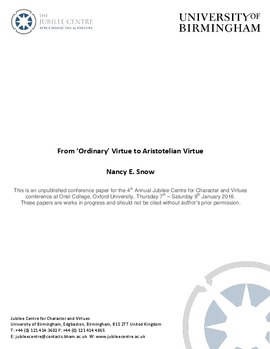From 'ordinary' virtue to Aristotelian virtue
Abstract
In two earlier papers, I began to explore how “ordinary people” acquire virtue. By “ordinary people,” I mean people, not specifically or directly concerned with becoming virtuous, who have goals or aims the pursuit of which requires them to develop virtue. E.g., parents acquire patience and generosity in the course of pursuing their goal to be good parents; those concerned with being peacemakers acquire tact and diplomacy in the pursuit of that goal, and so on. These virtues can be viewed by those who seek them to be of instrumental and not intrinsic value, that is, needed for goal attainment but not necessarily valuable in their own right. Moreover, the virtues so acquired need not be substantially informed by reflective deliberation (Aristotelian phronesis). Are there pathways by means of which possessors of ordinary virtue can develop Aristotelian virtue, by coming to view the virtues they possess as having intrinsic value; and developing their phronetic capacities such that their virtues become informed by practical wisdom? In this essay, I continue the exploration of ordinary virtue with an eye to revealing possible pathways by which ordinary virtue can indeed take on the characteristics of full Aristotelian virtue. In the spirit of empirical collaboration, I suggest these pathways of virtue development as testable hypotheses.
Collections
- Moral Self Archive [59]
